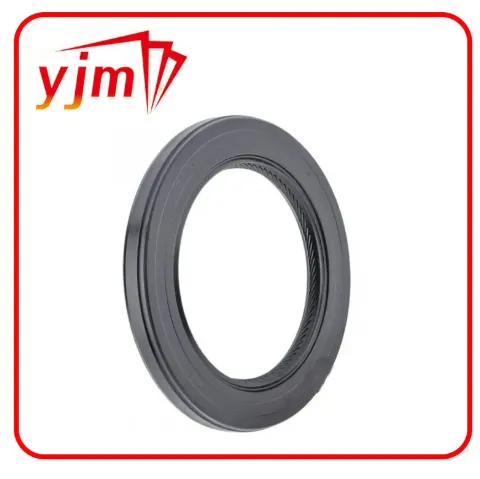A Comprehensive Guide to Oil Seals: Types, Materials, and Where to Buy
Oil seals are essential components in machinery and automotive systems, preventing lubricants from leaking and contaminants from entering sensitive components. Whether you're dealing with rotating shafts or hydraulic systems, the right oil seal ensures equipment longevity and performance. In this article, we’ll explore types of oil seals, delve into seal oil materials, compare lip and mechanical oil seal types, and guide you to high-pressure oil seal suppliers with products like seal oil for sale.

Types of Oil Seals: Understanding the Basics
Oil seals come in various configurations, each designed to suit specific applications. The most common types include:
Single Lip Oil Seals
These feature a single sealing lip that contacts the shaft. They're ideal for low-pressure environments where basic lubricant retention is needed.
Double Lip Oil Seals
Equipped with an additional dust lip to prevent external contaminants, these seals offer extra protection and are popular in agricultural and off-road machinery.
Sigilli à cassette
Often used in heavy-duty applications, cassette seals are complex units that include multiple sealing lips and a protective casing. They’re excellent for harsh environments like mining or marine industries.
V-Ring Seals
V-ring seals are flexible rubber seals that rotate with the shaft and act as a flinger to protect against dirt, dust, and water.
Hydraulic Oil Seals
These are specifically engineered for hydraulic cylinders and pistons, handling both linear and rotary motion while withstanding high pressure.
Understanding these oil seal types ensures you select the right one for your machinery's performance and durability.
Lip Seal and Mechanical Oil Seal Types
When categorizing oil seals, two broad classifications dominate: lip seals and mechanical oil seals. Each type has its design advantages and application scope.
Lip Seal Types
Lip seals—also known as radial shaft seals—have one or more flexible lips in contact with the shaft. Types include:
Spring-energized lip seals: Provide consistent pressure on the shaft for enhanced sealing.
PTFE lip seals: Made from Teflon for chemical resistance and low friction.
Split lip seals: Easy to install without disassembling machinery, ideal for maintenance-intensive operations.
Mechanical Oil Seal Types
These seals use more rigid materials and are often spring-loaded or supported by metal casings. Common types include:
Mechanical face seals (duo cone seals): Designed for extreme environments, commonly used in construction and heavy-duty vehicles.
Labyrinth seals: Rely on tight clearances and intricate paths to restrict fluid movement, rather than direct contact.
Bellows mechanical seals: Allow for axial movement, making them suitable for pumps and compressors.
Choosing between lip and mechanical seals depends on the system’s pressure, temperature, movement type (rotary or linear), and environmental conditions.
Oil Seal Materials and High-Pressure Seal Suppliers
The material used in oil seals directly impacts their resistance to temperature, chemicals, and wear. Here's a look at common oil seal materials:
Nitrile Rubber (NBR)
Pros: Excellent resistance to oil and fuel.
Cons: Not ideal for high-temperature or ozone-rich environments.
Best for: Automotive and general industrial applications.
Fluorocarbon (FKM/Viton)
Pros: Superior temperature and chemical resistance.
Cons: Higher cost.
Best for: High-performance engines, aerospace, and chemical industries.
Silicone Rubber
Pros: Exceptional flexibility at low and high temperatures.
Cons: Poor resistance to fuel and oil.
Best for: Static sealing and environments with temperature extremes.
Polytetrafluoroethylene (PTFE)
Pros: Chemically inert, high thermal resistance.
Cons: Not elastomeric, needs careful installation.
Best for: Aggressive chemicals, pharmaceutical, and food processing industries.
Polyacrylate Rubber (ACM)
Pros: Good resistance to heat and oxidation.
Cons: Flessibilità limitata à u friddu.
Best for: Transmission systems and high-temperature oils.
When dealing with high-pressure applications, such as in hydraulic systems or power steering, standard seals may fail. That’s where high-pressure oil seal suppliers step in. Look for manufacturers that offer:
Reinforced lip designs for pressure resistance.
Composite materials with metal inserts.
Custom sealing profiles for extreme pressure and speed.
Suppliers like SKF, Freudenberg, and Parker Hannifin are renowned for offering high-pressure seals tailored to demanding environments. Many also feature seal oil for sale in ready-to-ship inventories, ensuring minimal downtime.
Selecting the right oil seal—whether it's a lip seal or mechanical variant—starts with understanding the operating environment, pressure demands, and seal material compatibility. With numerous types of oil seals and oil seal materials available, there's a suitable option for nearly every application, from automotive to industrial machinery. Don't forget to work with reputable high-pressure oil seal suppliers, especially when performance and safety are paramount.
If you're ready to browse products, explore options like seal oil for sale online or connect with industrial distributors for expert recommendations.
-
Seal 12x20x5: Precision Radial Shaft Seals for Industrial Reliability
News Nov.24,2025
-
Seal 12x18x5: Essential Guide to Specifications, Applications & Vendors
News Nov.24,2025
-
Understanding Seal 12 20 5: Applications, Specifications & Industry Insights
News Nov.23,2025
-
Durable Oil Seal 85x110x12 – Reliable Sealing Solutions for Industry
News Nov.23,2025
-
Durable and Precise Oil Seal 75x95x10 for Efficient Machinery | YJM Seal
News Nov.22,2025
-
Durable Oil Seal 75x100x10 for Reliable Industrial Performance | YJM Seal
News Nov.22,2025
-
High-Quality Oil Seal 65x90x10 | Durable & Reliable Sealing Solutions
News Nov.22,2025
categurie di prudutti















